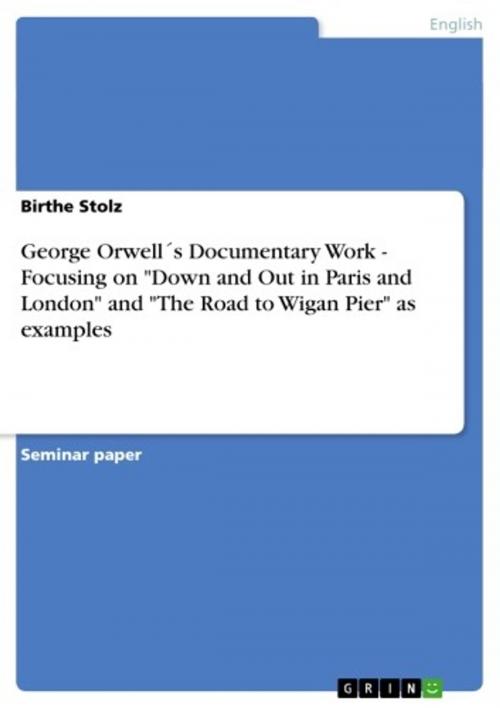George Orwell´s Documentary Work - Focusing on 'Down and Out in Paris and London' and 'The Road to Wigan Pier' as examples
Focusing on 'Down and Out in Paris and London' and 'The Road to Wigan Pier' as examples
Fiction & Literature, Literary Theory & Criticism, British| Author: | Birthe Stolz | ISBN: | 9783638346238 |
| Publisher: | GRIN Verlag | Publication: | February 2, 2005 |
| Imprint: | GRIN Verlag | Language: | English |
| Author: | Birthe Stolz |
| ISBN: | 9783638346238 |
| Publisher: | GRIN Verlag |
| Publication: | February 2, 2005 |
| Imprint: | GRIN Verlag |
| Language: | English |
Seminar paper from the year 2003 in the subject English Language and Literature Studies - Literature, grade: 2+, University of Duisburg-Essen, course: Dystopian Literature - Huxley and Orwell, 27 entries in the bibliography, language: English, abstract: In this term paper I want to focus on two of the most popular documentaries by George Orwell: Down and Out in Paris and London and The Road to Wigan Pier. While most people, when hearing the name George Orwell, think of the novel 1984 and the fable Animal Farm, only a few know that his first literary successes were books of a very different genre. The documentaries DOPL and RWP influenced his career as a political writer and coined him as an ambivalent left-wing intellectual. The term paper is structured chronologically, first dealing with DOPL and then focusing on RWP. In order to understand Orwell´s curiosity regarding the English working-class and the poor in general, I found it important to give a brief overview on his social background (chapter 2). I will then continue with explaining the circumstances in which Orwell found himself before going to London and Paris and describing his motives for living among the oppressed (chapter 3.1). In order to give an impression of the contents of the book, chapter 3.2 summarizes the most interesting and important passages and quotations. Chapter. 3.3 focuses on the style and the literary means. The last chapter on DOPL (chapter 3.4) refers to Orwell´s political standpoint when writing the book, including opinions and reactions to the latter. Chapter 4.1 begins with a description of the political and economic situation in the 1930´s. In my mind, it is important to get an impression of the problems and circumstances of the historical background when Orwell gathered the material for RWP because the time is closely connected with the content of the book. In the next chapter, I again will give an answer to the question why Orwell wrote this book which in this case is a little different because it was commissioned. Furthermore I will discuss the meaning and the function of the Left Book Club which played an important role in respect of RWP. Chapter 4.3 summarizes the two parts of the book while chapter 4.4. again focuses on stylistic and literary means. The importance of the political substance of RWP is mirrored in chapter 4.5, including Orwell´s aims, analysis, definition of socialism and his attacks on middle-class socialists. The last chapter of the term paper deals with the controversial opinions RWP called forth and especially with its opponents of the left-wing intelligentsia.
Seminar paper from the year 2003 in the subject English Language and Literature Studies - Literature, grade: 2+, University of Duisburg-Essen, course: Dystopian Literature - Huxley and Orwell, 27 entries in the bibliography, language: English, abstract: In this term paper I want to focus on two of the most popular documentaries by George Orwell: Down and Out in Paris and London and The Road to Wigan Pier. While most people, when hearing the name George Orwell, think of the novel 1984 and the fable Animal Farm, only a few know that his first literary successes were books of a very different genre. The documentaries DOPL and RWP influenced his career as a political writer and coined him as an ambivalent left-wing intellectual. The term paper is structured chronologically, first dealing with DOPL and then focusing on RWP. In order to understand Orwell´s curiosity regarding the English working-class and the poor in general, I found it important to give a brief overview on his social background (chapter 2). I will then continue with explaining the circumstances in which Orwell found himself before going to London and Paris and describing his motives for living among the oppressed (chapter 3.1). In order to give an impression of the contents of the book, chapter 3.2 summarizes the most interesting and important passages and quotations. Chapter. 3.3 focuses on the style and the literary means. The last chapter on DOPL (chapter 3.4) refers to Orwell´s political standpoint when writing the book, including opinions and reactions to the latter. Chapter 4.1 begins with a description of the political and economic situation in the 1930´s. In my mind, it is important to get an impression of the problems and circumstances of the historical background when Orwell gathered the material for RWP because the time is closely connected with the content of the book. In the next chapter, I again will give an answer to the question why Orwell wrote this book which in this case is a little different because it was commissioned. Furthermore I will discuss the meaning and the function of the Left Book Club which played an important role in respect of RWP. Chapter 4.3 summarizes the two parts of the book while chapter 4.4. again focuses on stylistic and literary means. The importance of the political substance of RWP is mirrored in chapter 4.5, including Orwell´s aims, analysis, definition of socialism and his attacks on middle-class socialists. The last chapter of the term paper deals with the controversial opinions RWP called forth and especially with its opponents of the left-wing intelligentsia.















